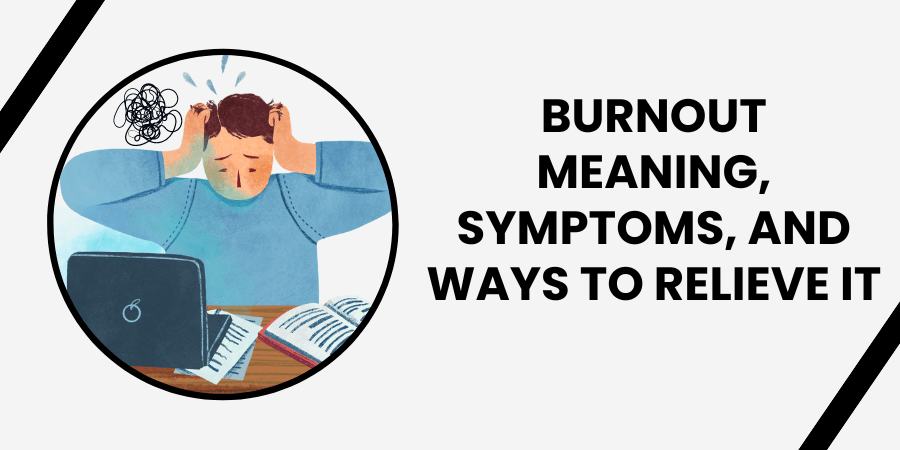Burnout Meaning, Symptoms, And Ways To Relieve It
August 07, 2023
Anis

Each individual experiences stressful challenges in their work or academic life. Whether a civilian employee or a university student, burnout negatively affects one's productivity.
Many people need to understand what burnout is. It manifests as dreading going to work, losing enthusiasm, and feeling constantly tired.
It indicates a connection to one's mental and physical well-being.
Therefore, in this article, we will discuss the meaning of burnout, its symptoms, and ways to relieve exhaustion to restore balance in your life.
Burnout Meaning

Image source: iStock
Have you noticed that when you are at work or on campus, people tend to ask about how you are doing?
Not just in terms of your work progress, but in regards to your overall well-being?
Questions like "Are you okay?" or "Do you need any help?" may seem concerning.
But they often indicate that those people around you have noticed a change in your behavior.
Perhaps you appear more tired, stressed, or less energetic than usual.
If this is the case, it could be an early sign of burnout.
Burnout is a state of emotional, physical, and mental exhaustion that arises from prolonged stress.
It occurs when you feel overwhelmed or unable to meet the demands of your work or studies.
If these feelings persist, you begin to lose motivation and interest in what you once enjoyed.
It can severely impact your productivity and energy levels, causing you to feel hopeless and drained.
Over time, burnout can lead to adverse long-term effects on your social life and health.
So, it is important to recognize the signs of burnout and take steps to prevent it from taking over your life.
What’s The Difference; Burnout And Tired?
As mentioned earlier, it is vital to note that prolonged stress can negatively affect one's emotional, physical, and mental well-being. Such feelings are commonly referred to as burnout.
However, some people misunderstand burnout and use it interchangeably with tiredness.
This can lead to individuals claiming to have burnout when they are simply tired.
It is a significant issue because people may take longer breaks than necessary when they proclaim burnout.
I know it sounds ridiculous, but it does happen to certain people.
So, how do you know if you are experiencing tiredness or actual burnout?
If you are tired, a short break like chatting with friends, sleeping, or engaging in hobbies can help you feel better.
You only need a brief moment to recover from tiredness, and you do not isolate yourself from the world.
Engaging in activities such as organizing your home, traveling, or participating in fun and adventurous sports can also recharge your social batteries.
Burnout, on the other hand, is characterized by persistent fatigue that does not go away easily.
It drains your energy; even a weekend break would not restore it.
You may no longer find joy in things that excite you (or numb). Hence, you prefer to shut yourself off from the world.
Burnout can result from excessive workloads, multiple deadlines, lack of support or motivation from colleagues, and unfair treatment.
You should know that burnout makes you look like a lifeless, walking zombie.
Burnout Symptoms
This section is of utmost importance as many individuals seek to recognize the symptoms of burnout.
Burnouts can occur both in the workplace and academic settings, and the following symptoms may be experienced by workers or students:
Workplace burnout may arise from:
- The lack of recognition or reward.
- Unclear job responsibilities.
- An overwhelming and high-pressure work environment.
- Multiple deadlines.
- Excessive workloads.
- Doing unchallenged work.
On the other hand, academic burnout may result from:
- A lack of motivation to attend class or complete assignments.
- A loss of confidence in academic abilities.
- A lack of inspiration for the projects.
- Unable to meet assignment deadlines.
Frequent occurrences of burnout can lead to various health issues such as fever, headaches, and flu.
Additionally, burnout can result in unhealthy habits like staying up late, nail-biting and binge eating.
6 Ways To Relieve Burnout
1. Identify the cause
The first step to relieving prolonged distress is identifying the underlying cause.
It would be best to reflect on the factors or symptoms contributing to the exhaustion in the workplace and on campus.
It could be due to excessive workloads or multiple deadlines. By doing so, you can provide the best solutions to the identified factor.
2. Refuse unnecessary tasks
Next, you must refuse tasks that overburden and shift away from your commitments.
For instance, if you are responsible for evaluating the assessment, you need to prioritize it and set realistic goals.
Assessment goals such as being free from errors, punctuality, and getting approved by superiors are what you should focus on.
Hence, if someone asks you to do extra work that is out of your responsibility (or in some cases, they might guilt trip you), do not quickly agree to take over the job.
3. Communicate your feelings

Image source: iStock
Alternatively, you can communicate your feelings with family, close friends, or colleagues you trust.
Being open to your feelings and discussing your struggles can ease your emotional burden and provide a fresh perspective on handling challenges.
4. Do some exercises

Image source: iStock
Did you know that exercises are the best meditation for burnout?
Exercise does not necessarily mean that you do intense workouts (even though it works for some individuals).
Taking regular breaks, like a brief walk outside, can do wonders for reducing stress levels.
To add a bit of excitement, you can bring your best and fluffy companion too!
Looking at your dog or cat doing something goofy always cheers us up.
5. Engaging in your hobbies
Engaging in hobbies or entertainment helps a lot in reducing stress levels.
Dedicate your time to activities that bring joy and relaxation.
For instance, hiking is an extreme sport. It is challenging, but the journey of reaching the peak is always rewarding.
Or you join for a concert.
Sometimes, the music, cheering crowd, and your favorite artist's live vocals can soothe the overwhelming feelings.
I know that attending a concert might not affordable for some people. But if you may afford the ticket, then go for it! It is totally worth every penny that you spend.
6. Seek professional help
Lastly, you seek professional help if distress has become overwhelming for you.
Burnout is not a trivial matter.
Suppose you do not seek professional help as a precautionary step. In that case, it might affect your mental well-being in the long term.
Therapy or counseling can provide valuable insights and coping strategies for your burnout.
In conclusion, it is essential to be aware of the signs of burnout and take necessary measures to address it.
Prioritizing self-care, setting achievable goals, and seeking support when required are effective ways to combat burnout.
It's important to remember that burnout is not a sign of weakness but rather a sign of paying attention to your body and mind.
You can regain balance and live a happier, healthier life by taking steps to alleviate burnout.
Kickstart your education in Malaysia
We'll help you find and apply for your dream university
You might be interested in...
- Is Taking an Academic Break the Right Decision for You?
- What Are the Common Misconceptions About Studying Locally in Malaysia?
- Sunway University Partners with Universiti Kebangsaan Malaysia to Offer Medical Doctor Programme
- Sunway University Leads the Way as Host of THE Asia Universities Summit
- Sunway University Announces the Commencement of its LaunchX 2024 Cohort From March to August 2024
- Promoting Health and Well-being: Initiatives by Universities in Malaysia
- Raising Awareness of Microplastic Pollution on International Mother Earth Day
- Exploring Distance Learning: Course Offerings at Universities in Malaysia
- The Role of Education in Promoting Health Equity: Lessons from World Health Day 2024
- Navigating Credit Transfers: A Guide for Students Switching Institutions








